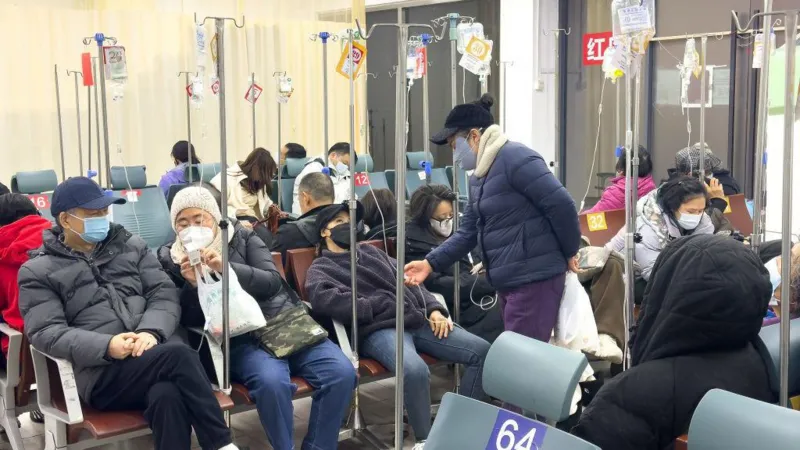The beginning of 2025 has evoked gruesome memories of the Covid-19 outbreak in China that occurred five years ago, thanks to the surge in the cases of human metapneumovirus (HMPV) across the country now.
Hospitals in China are overcrowded with infected patients and people are wearing masks while social media is abuzz with possibilities of lockdowns.
It is a horrifying reminder of the beginning of the Covid-19 pandemic and subsequent lockdowns not only for Chinese people but the global population as well.
Several videos appeared on social media, which showed Chinese people with symptoms such as cold and cough rushing to hospitals.
Some patients appeared to be at risk of dying due to serious lung infections.
Professor Jill Carr, a virologist at Flinders University, said “HMPV can certainly make people very sick” even though the scientific community was aware of its genetic diversity and epidemiology.
Hospitals in China are overwhelmed with people with masks even as the waiting list continues to swell. Children’s hospitals are the worst affected.
In the first week of January, HPMV infections soared by 529 percent in China, affecting people from all age groups.
It has been detected in almost every part of China, including Beijing, Chongqing, and Guangdong.
This has made the world concerned about the possibility of a repeat of the Covid-19 pandemic that started in China five years ago.
some countries have begun monitoring flights coming from China. Experts have toned down the threats arising from the HPMV. However, people grew apprehensive as the virus has been spreading like wildfire in China.
The thoughts of the “mystery” virus coming from China cautioned people worldwide.
“I think part of what’s playing into this worry is the recency bias is Covid-19 having started in China,” Dr Simon Williams, a behavioural scientist, who has also worked as a consultant for WHO.
Kan Biao, head of China’s National Institute for Communicable Disease Control and Prevention, said higher illness spread was expected and the rate of HMPV among children aged 14 and under was increasing.
Schools have been shut in Wuhan following a sharp increase in HPMV infections, which saw 30 children falling sick.
Interestingly, Wuhan was the origin of the fatal coronavirus outbreak in 2019-20.
While Chinese health experts are calling the HPMV less severe than the coronavirus, the former poses a serious risk to babies, older people, and those with weakened immune systems.
Moreover, it is more difficult to track down than other viruses, said Dr Peter Openshaw, an expert on the flu and respiratory syncytial virus (RSV) from Imperial College London.
“It’s a very important pathogen, quite hard to detect, and often doesn’t show up even on the lab tests that are done in hospital,” he said.
Williams said people are scared that the virus may lead to another pandemic against the backdrop of the Chinese government’s secretive behaviour and failure to contain coronavirus earlier.
And a few mysterious deaths have panicked people. “A lot of people have caught colds, and most of them have illness. About seven or eight people died this week in this area. Some were in their 50s, 60s, 70s, 80s and 40s,” said a farmer from Wuhan.
According to the Chinese Centre for Disease Control and Prevention, the HPMV accounted for 5.4 per cent of hospitalisations, which is more than that for coronavirus.
The crammed hospitals, masked people in public places, uncertainty about the medical solution, and crowded crematoriums in China are the sights reminiscent of the frightful Covid-19 pandemic.
Chinese people are rushing to seek medical help upon experiencing issues with the respiratory system.
Hospitals in China are overwhelmed with people with masks even as the waiting list continues to swell. Children’s hospitals are the worst affected.
Crematoriums and funeral homes in China are crowded even as the Beijing government maintained that everything was under control.
“There are long lines for cremation now, today, three VIP furnaces were opened,” said a funeral director named Ms Wang.
Dr Jacqueline Stephens, a senior lecturer at Flinders University said people had become more cautious of outbreaks now. “Everyone is hypervigilant, and you hear this term human metapneumovirus and it sounds kind of scary,” she said.
Notably, there is no vaccine available to neutralise the HPMV even as the cases of infections are surging significantly, said Prof Paul Griffin, director of infectious diseases at Mater Health.
The crammed hospitals, masked people in public places, uncertainty about the medical solution, and crowded crematoriums in China are the sights reminiscent of the frightful Covid-19 pandemic.









Comment